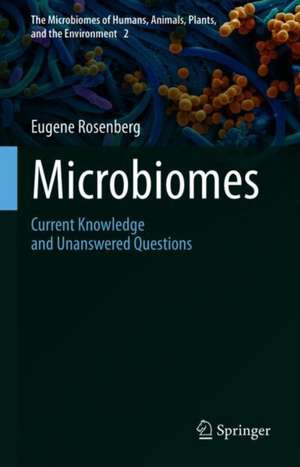Microbiomes: Current Knowledge and Unanswered Questions: The Microbiomes of Humans, Animals, Plants, and the Environment, cartea 2
Autor Eugene Rosenbergen Limba Engleză Hardback – 3 mar 2021
This follow-up to the successful book The Hologenome Concept: Human, Animal and Plant Microbiota, published in 2013, provides a contemporary overview of microbiomes. It appeals to anyone working in the life sciences and biomedicine.
| Toate formatele și edițiile | Preț | Express |
|---|---|---|
| Paperback (1) | 1114.96 lei 6-8 săpt. | |
| Springer International Publishing – 4 mar 2022 | 1114.96 lei 6-8 săpt. | |
| Hardback (1) | 964.60 lei 38-44 zile | |
| Springer International Publishing – 3 mar 2021 | 964.60 lei 38-44 zile |
Preț: 964.60 lei
Preț vechi: 1269.22 lei
-24% Nou
Puncte Express: 1447
Preț estimativ în valută:
184.57€ • 193.23$ • 152.72£
184.57€ • 193.23$ • 152.72£
Carte tipărită la comandă
Livrare economică 01-07 aprilie
Preluare comenzi: 021 569.72.76
Specificații
ISBN-13: 9783030653163
ISBN-10: 3030653161
Pagini: 431
Ilustrații: XIII, 431 p. 14 illus., 10 illus. in color.
Dimensiuni: 155 x 235 mm
Greutate: 0.91 kg
Ediția:1st ed. 2021
Editura: Springer International Publishing
Colecția Springer
Seria The Microbiomes of Humans, Animals, Plants, and the Environment
Locul publicării:Cham, Switzerland
ISBN-10: 3030653161
Pagini: 431
Ilustrații: XIII, 431 p. 14 illus., 10 illus. in color.
Dimensiuni: 155 x 235 mm
Greutate: 0.91 kg
Ediția:1st ed. 2021
Editura: Springer International Publishing
Colecția Springer
Seria The Microbiomes of Humans, Animals, Plants, and the Environment
Locul publicării:Cham, Switzerland
Cuprins
Introduction.- Composition of Microbiomes.- Dynamics of Microbiomes.- Holistic Fitness: Microbiomes are Part of the Holobiont`s Fitness.- Transmission of Hologenomes Between Generations: Mothers Matter Most.- Eukaryotic Microorganisms are Part of Holobionts.- Viruses are Part of the Holobiont`s Fitness and Evolution.- Genetic Variation in Holobionts.- Evolution of Holobionts: The Hologenome Concept.- Microbiomes in Medicine and Agriculture.- Microbiomes: Some Philosophical and Sociological Implications.
Notă biografică
Eugene Rosenberg is an Emeritus Professor of Microbiology at the Faculty of Life Sciences at Tel Aviv University. He has performed pioneer research on Myxobacteria, microorganisms to combat hydrocarbon pollution (bioremediation), coral disease, and together with Ilana Zilber-Rosenberg proposed the hologenome concept of evolution. He has received numerous awards, including a Guggenheim Foundation Fellowship, serving as a Fogarty International scholar at the NIH, the Pan Lab Prize of the Society of Industrial Microbiology, the Israel Prize for a Beautiful Israel, the Procter & Gamble Prize of the American Society for Microbiology, and the Karl August Möbius Prize (Germany) for lifetime achievements in symbiosis. He is a Fellow of the American Academy of Microbiology and a founding member of the European Academy of Microbiology.
Textul de pe ultima copertă
This book examines an important paradigm shift in biology: Plants and animals, traditionally viewed as individuals, are now considered to be complex systems and host to a plethora of microorganisms. After first presenting historical aspects of microbiota research, bacterial compositions of individual microbiomes and the critical analysis of current methods, the book discusses how microbial communities inside the human body are profoundly affected by numerous factors, such as macro- and micro-nutrients, physical exercise, antibiotics, gender and age. As described by current research, the author highlights how microbiomes contribute to the fitness of the host by providing nutrients, inhibiting pathogens, aiding in the storage of fat during pregnancy, and contributing to development and behavior. The author not only focusses on prokaryotic components in microbiomes, but also addresses single-cell eukaryotes and viruses.
This follow-up to the successful book The HologenomeConcept: Human, Animal and Plant Microbiota, published in 2013, provides a contemporary overview of microbiomes. It appeals to anyone working in the life sciences and biomedicine.
Caracteristici
Discusses the composition and role of microbiomes in humans, animals and plants Illuminates the hologenome concept of evolution from different angles Reviews data on the role of beneficial microbiota in preventing and treating disease



